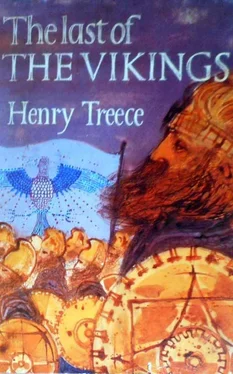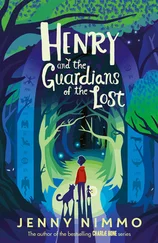Henry Treece - The Last of the Vikings
Здесь есть возможность читать онлайн «Henry Treece - The Last of the Vikings» — ознакомительный отрывок электронной книги совершенно бесплатно, а после прочтения отрывка купить полную версию. В некоторых случаях можно слушать аудио, скачать через торрент в формате fb2 и присутствует краткое содержание. Жанр: unrecognised, на английском языке. Описание произведения, (предисловие) а так же отзывы посетителей доступны на портале библиотеки ЛибКат.
- Название:The Last of the Vikings
- Автор:
- Жанр:
- Год:неизвестен
- ISBN:нет данных
- Рейтинг книги:3 / 5. Голосов: 1
-
Избранное:Добавить в избранное
- Отзывы:
-
Ваша оценка:
- 60
- 1
- 2
- 3
- 4
- 5
The Last of the Vikings: краткое содержание, описание и аннотация
Предлагаем к чтению аннотацию, описание, краткое содержание или предисловие (зависит от того, что написал сам автор книги «The Last of the Vikings»). Если вы не нашли необходимую информацию о книге — напишите в комментариях, мы постараемся отыскать её.
The Last of the Vikings — читать онлайн ознакомительный отрывок
Ниже представлен текст книги, разбитый по страницам. Система сохранения места последней прочитанной страницы, позволяет с удобством читать онлайн бесплатно книгу «The Last of the Vikings», без необходимости каждый раз заново искать на чём Вы остановились. Поставьте закладку, и сможете в любой момент перейти на страницу, на которой закончили чтение.
Интервал:
Закладка:
Prologue
Although it was the end of September, the weather up in Yorkshire did not seem to know it, and the sun beat down from a cloudless blue sky for all the world as if it was mid-summer. In a broad green meadow beside the river Derwent, a host of men lay under the sunshine, laughing and joking like merry feasters at the end of Lent; or like resting pilgrims on the way to Santiago's distant shrine, forgetting their long journey for a while. Listening to the din they made, a man would hardly know where they came from, for the air was laden with the sounds of Norwegian and Icelandic, of Flemish and French, of Scotch Gaelic and English. There were upwards of two thousand men in the great field, so it is little wonder that the birds were silent and the sunlit sky above them empty. That is, empty save for three carrion crows who circled curiously back and forth, crying discordantly from time to time; and, higher in the upper air, a broad-winged goshawk which hovered at times, almost motionless in the sky, noting everything with his cold sharp eye. Unlike the crows, this hawk was silent, for he was a warrior-bird and knew what manner of men sprawled out below him on the green turf. His watchful eye had told him that this was no crowd of pilgrims, for he had noted the swords and axes, the shields and mail coats, the helmets and javelins that lay everywhere beside the men, on the trampled turf, cast down because of the sun's warmth.
And especially the hawk noticed a broad banner that lay, spread over a hillock to keep its white silk unwrinkled, for on this banner was pictured another great bird, the black raven with its wings outspread, Odin's bird.
Close to the raven-banner, three score men sat in a ring laughing, and in their midst, a giant with flax-yellow hair and beard, merrier than the rest. The hawk came lower to look at this man, for he seemed to be three heads taller than all about him, though they were not small men either.
But suddenly the giant turned back his head and with a stiff arm pointed upwards. 'Away with you, goshawk,' he called in a hard voice, 'today's business is for men, not birds. We'll send for you if we need you.'
The men in the circle laughed at this and one of them even took a leather sling and sent a round pebble whistling up towards the bird. The goshawk did not stay to be insulted further, but wheeled with a flick of his broad pinions and rode the warm waves of air towards the west, setting his course for the oakwoods that stood above York.
Down below, the giant laughed and said to the slinger, 'Why, man Ljot, you are almost as good a hand with the sling as you are with the axe.'
'So I should be, King Harald,' said black-bearded Ljot, wrapping his sling up carefully and tucking it into his calf-skin pouch, 'I spent my boyhood learning to cast a stone, up in Orkney, at my father's steading. It was the only way to keep the wild-cat from harrying the new-born lambs. A man can't catch a wild-cat with an axe, you know, Hardrada.'
The giant called Hardrada stared at Ljot, his short flaxen beard jutting out and his thick moustaches hanging down on either side of it. For a moment, his scarred nut-brown face looked harsh. The light blue eyes which gazed out of it, one eyebrow set higher than the other, seemed as cold as northern icebergs. He said, 'Do you think I could catch a wild-cat with an axe, fellow?'
Ljot shrugged his shoulders and grinned. 'Well,' he said, 'you are brisker than most men in the world, as well as being bigger. You have caught many a Turk unawares, and that takes some doing! Besides, you have the blessing of God on you, since you once helped to build the Church in Jerusalem, over the grave of Jesus Christ, when you were soldiering for the Emperor of the Greeks. Yes, on second thoughts, you might outwit a wild-cat.'
The face of Harald Hardrada relaxed into a smile, though such a fierce smile that it was harder to bear than most men's scowling, and he said, 'You did not mention that I am King of Norway. Does that not count?'
Black-bearded Ljot plucked a grass-stem and began to chew it, though he still looked from under his eyelids at the Norse King. 'Aye,' he said casually at last, 'that does count, a little, Harald. But it would count even more if you were King of England as well: then, the wild-cats would run for their lives only to see your shadow on the hillside.'
Harald Hardrada, King of Norway, frowned again and seemed to forget Ljot altogether. Between his clenched white teeth, he said, almost to himself, 'That day has come. That is why we are here. Before this hot sun sets, if God wills it, and my raven-banner, Landwaster, has not lost its magic, I shall have a second crown to wear.'
Ljot stopped chewing the grass-stalk and said, daringly, 'You will have to share it with Earl Tostig of Northumbria there, since he fetched you over the sea to kill his brother, the English king. Perhaps you could wear the crown turn and turn about: you on Monday, Tostig on Tuesday, then you again on Wednesday. Yes, certainly Wednesday, since that is Odin's day...'
But Harald Hardrada did not answer him. Instead, he called across to the next hillock, where a group of English carles stood, leaning on their spears, and talking to a grizzled man who wore a scarlet tunic of fine silk and swung a gilded helmet carelessly on his thick forefinger.
'Hey, Tostig,' cried King Harald, 'which days do you want to wear the crown when we take it from your brother?'
Earl Tostig stopped talking to his spearmen and turned towards the lounging Norse king. 'I have no preferences, my lord,' he said, smiling strangely, 'as long as we can get our hands on it.'
A tall spearman standing next to the earl said under his breath, 'When we have the crown safely in our grip, it will be a lucky Norseman who ever sees it, much less wears it, at all!'
But Earl Tostig did not seem to hear these words; he only smiled again, with a quick twitch of the lips that spread upwards towards his eyelids.
King Harald of Norway turned away from him, as though he had forgotten him all at once, and said to Ljot again, 'I wonder if you would be good enough to hoist my banner, Landwaster, on the hilltop here? I would like to see it flapping in the English breezes. The banner-bearer, old Fridrek, will help you: he has hoisted it many times, and knows how to manage it when the wind gets into the cloth.'
Ljot rose to his feet and said, 'I have sailed from Orkney to Iceland, and back, in autumn gales, two score of times; and each time I have hoisted the sail of my own longship. A man who can hoist a sail single-handed needs no help in hoisting a mere banner.'
King Harald's face became hard at this. His hands were clasped together and when he heard Ljot's words, he clenched his fingers so tightly together that the knuckles cracked. He said, 'After such boasting, you had better hoist my banner well, friend Ljot. I am not short of Orkneymen, remember, but there is only one Landwaster.'
Many men, sitting in that ring, wished that Ljot had not been so outspoken and that Harald had not answered him so hotly. Before a battle, it ill becomes any man, king or carle, to speak such words as may be heard elsewhere and remembered, if the luck falls on the other side of the fence.
And now the luck seemed to fall strangely, for as Ljot grasped the tall ash-pole, a sudden gust of wind came from nowhere and wrenched at the heavy silken cloth, bellying it out like a sail so that no three men could have held it, much less driven the iron point into the ground.
Landwaster crashed back to the turf, its long folds whirling about Ljot and dragging him down with it. And though he looked a foolish enough figure on the ground, with his legs kicking out, no one in the ring laughed, or even whispered. The silence that lay upon them all was much heavier than lead. Even the wind stopped blowing.
Читать дальшеИнтервал:
Закладка:
Похожие книги на «The Last of the Vikings»
Представляем Вашему вниманию похожие книги на «The Last of the Vikings» списком для выбора. Мы отобрали схожую по названию и смыслу литературу в надежде предоставить читателям больше вариантов отыскать новые, интересные, ещё непрочитанные произведения.
Обсуждение, отзывы о книге «The Last of the Vikings» и просто собственные мнения читателей. Оставьте ваши комментарии, напишите, что Вы думаете о произведении, его смысле или главных героях. Укажите что конкретно понравилось, а что нет, и почему Вы так считаете.











